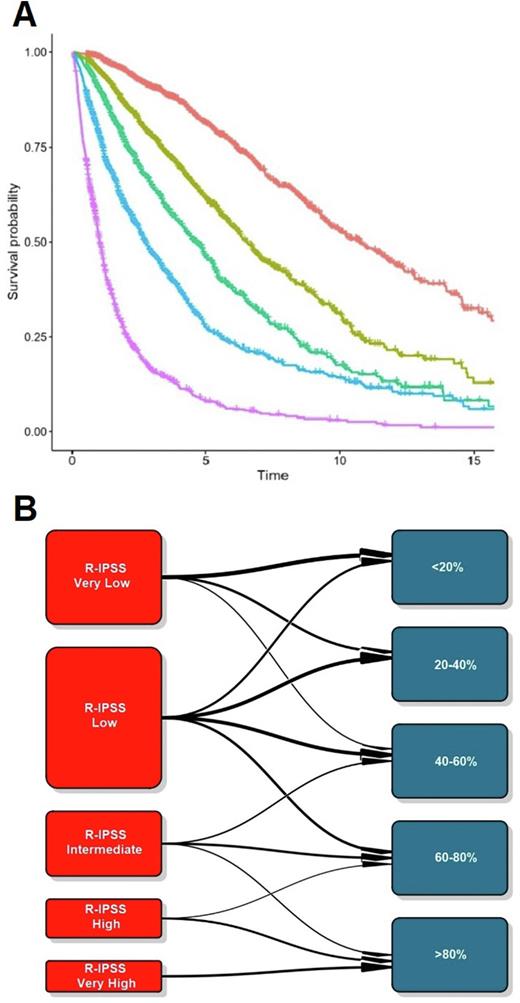Abstract
Purpose Myelodysplastic syndromes (MDS) are a heterogeneous group of stem cell neoplasms characterized by bone marrow (BM) failure, cytopenias and increased risk of acute leukemia. Patient survival and management rely upon individual prognosis; thus, precise disease risk prediction is critical for treatment decision-making. The IPSS-R is the most universally used prognostic classification. Despite its general success, it has limitations and a new proposal including molecular data has been recently proposed. However, molecular information is not feasible in all institutions. The aim of our study was to offer a new tool to evaluate the prognosis that includes only clinical and cytogenetic variables available at diagnosis.
Patient and Methods Registry data were retrieved from patients diagnosed with MDS in 90 Spanish institutions. We included 7,202 patients diagnosed between 2006 and 2022 who were randomly divided into a training set (80% of the cohort) and a test set (20% of the cohort). A machine learning (ML) technique (random forests) was used to model overall survival (OS) and leukemia-free survival (LFS) in the training set, and its performance was validated in the test set.
Results The ML model was based on eight clinical variables determined at MDS diagnosis (age, sex, BM blast, hemoglobin, leukocytes, platelet, % of neutrophils and IPSS-R cytogenetic risk group), and it achieved high accuracy in predicting OS (c-indexes; 0.759 and 0.776 in the training and test sets, respectively) and LFS (c-indexes; 0.812 and 0.845 in the training and test sets, respectively). The ML-model differentiates 5 risk subgroups comprising 20% of the population each with different OS and LFS (Figure 1 A). When compared with the IPSS-R, the ML model restratified around 60% of patients (Figure 1 B) to a different risk group. Importantly, both c-indexes and time-dependent areas under the curve (AUCs) confirmed that the model was superior to the IPSS-R and the age-adjusted IPSS-R in the global population. This difference persisted both in different age ranges (<65 years or >65 years) and in all MDS subgroups.
Conclusion The AIPSS-MDS (Artificial Intelligence Prognostic Scoring System for Myelodysplastic Syndromes) is based exclusively on clinical variables that are readily available in any healthcare facility. This simple model has high prognostic accuracy for predicting survival and leukemic transformation in patients with MDS, outperforming the IPSS-R. Indirect comparisons with other proposed risk models including NGS data (e.g., IPSS-M) suggest a similar prognostic performance. A free interactive online calculator is under development.
Disclosures
Mosquera Orgueira:Roche, Amgen, AstraZeneca, Janssen, Abbvie, Takeda, Brystol, GSK, Pfizer,: Consultancy, Honoraria, Research Funding. Ramos:BMS: Consultancy, Honoraria, Membership on an entity's Board of Directors or advisory committees; Janssen: Honoraria; Novartis: Honoraria; Abbvie: Honoraria; Pfizer: Honoraria; Astellas: Consultancy, Honoraria; Sandoz: Honoraria; Jazz: Honoraria. Jerez:BMS: Honoraria; Novartis: Honoraria; Gilead: Research Funding. Diez-Campelo:Novartis: Consultancy, Honoraria, Membership on an entity's Board of Directors or advisory committees; Bristol Myers Squibb: Consultancy, Honoraria, Membership on an entity's Board of Directors or advisory committees, Research Funding; BluePrint: Membership on an entity's Board of Directors or advisory committees; Takeda: Honoraria, Membership on an entity's Board of Directors or advisory committees.
Author notes
Asterisk with author names denotes non-ASH members.


